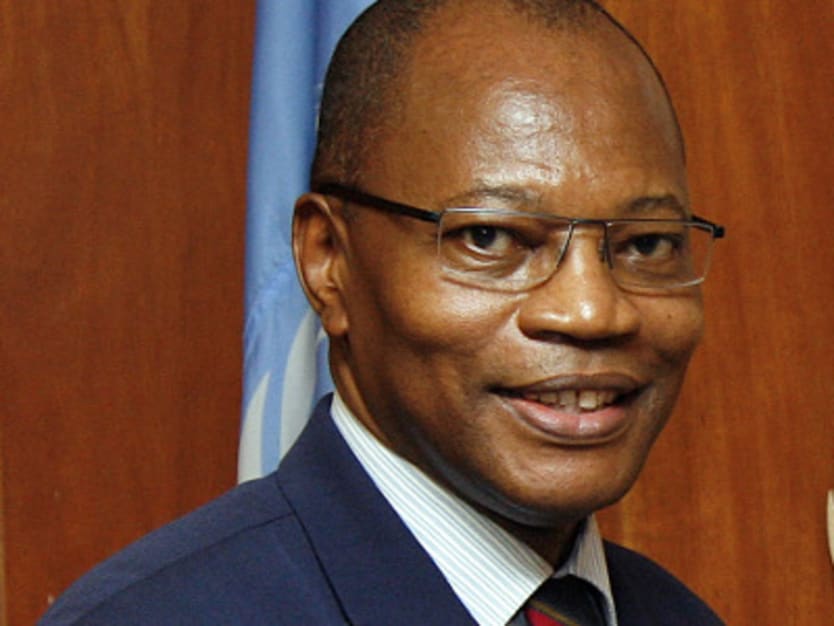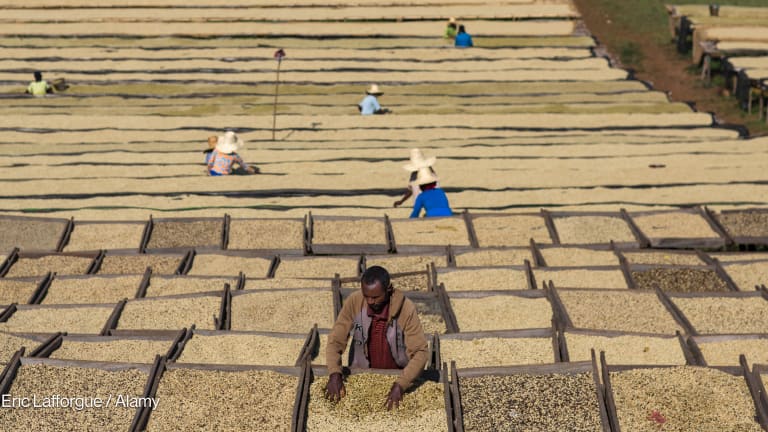
Mohamed Ibn Chambas has mixed feelings about the emerging collaboration of China and Europe to help Africa meet the Millennium Development Goals. While he welcomes such a partnership, the secretary-general of the African, Caribbean and Pacific group of states is concerned about the prospect that China will adopt what he sees as Europe’s “cumbersome procedures” in project implementation.
Since assuming his current post in November 2009, Chambas has witnessed a series of landmark events in the European Union’s development cooperation with Africa. These include the revision of the Cotonou agreement, establishment of the European External Action Service, the third Africa–EU summit and the second joint EU-Africa action plan.
Devex caught up with Chambas at the 2010 European Development Days in Brussels. In this first part of our two-part conversation with the the Ghanaian academic and politician, Chambas shared his hopes about Europe’s assistance to Africa.
What have been the most relevant outcomes for development cooperation between the European Union and Africa?
First off, one has to put focus again on the fact that so many African countries are not likely to meet the Millennium Development Goals, and, in that regard, both sides – Africa and Europe, the EU – have recommitted themselves to sprint to the end, to step up the efforts between now and 2015, to catch up and make every effort to achieve the objectives of reducing poverty, particularly in many of the fragile sub-Saharan African countries. So, that’s obviously very encouraging and noteworthy.
But beyond the fight for poverty and as far as development cooperation is concerned, we also appreciate, shall I call it, the shift to look at growth: what we need to do to ensure strong growth, continue growth on the African continent, [focusing on] agendas tackling Africa’s infrastructural deficit, working to create the socio-economic infrastructure of energy, of roads, of ports, and other infrastructure, which will create [a] healthy investment climate and, in the process, draw in investments to Africa, strengthening the private sector and, of course, create more jobs.
Once people are employed, that is also a short way of fighting poverty because when they earn incomes they can, of course, ensure that their children go to school, they can provide health for themselves and their families. We need to put the spotlight on what we do to create jobs – valuable jobs, not jobs created by the states just for sake of job creation, but jobs based on private sector, productive enterprises. This seems to be the focus, the shift which, again, in my view, is very welcome.
At the Africa-EU summit in Tripoli in November, Africa and Europe agreed on a specific agenda, which is now embodied in your 2011–2013 joint action plan. Do you have the resources to implement this agenda?
Yes, in terms of the resources, we were encouraged by the Europeans, ensuring that, in spite of the financial crisis, their member states remain committed not to reduce ODA [official development assistance], not to reduce the commitments to MDGs and other commitments already made.
But, at the same time, the re-focus is looking at how [the] private sector can also generate the kind of investments, the movement of capital and technology from Europe to Africa to meet … the opportunities that are available. We believe that there are real prospects for growth in Africa because of the huge resource base of the continent, be it in natural resources, be it in solid minerals, in agriculture etc., and, of course, in infrastructure.
[For instance,] such huge deficit in electricity means, at the same time, huge opportunities for investment, for companies which want to build plants, which want to build electricity grids to interconnect transmission power lines. So, these are all opportunities for investment in Africa. Once you provide, for instance, energy, it also would trigger a lot of production and improve productivity and great opportunities for investments across [the] world.
All of this can be in the context of the development of a private sector, African private sector, in partnership with [the] European private sector. And [the] European private sector must see these opportunities in Africa for investment, for job creation, as also a way in which, in fact, perhaps Africa can contribute to growth in Europe, through the investments that Europe would have made and the returns of investments, which are very high and which, incidentally, other partners are seeing.
When you talk [about] the bridges and the interests in Africa of China, of India or Brazil, it’s because they have seen the opportunities. They are investing in the opportunities, in win-win basis, and the two sides are driving benefits. Europe should see that these opportunities are there. It is even wrong to say that Europe is welcome because Europe is there already. It is just that the structure has been too much just on taking raw materials from Africa without seeing the need for investing in [a] diversified portfolio of investments in Africa. That’s what Europe is called upon to do now.
China is sending aid to Africa, and a trilateral dialogue with Africa and EU is being implemented. What are the real possibilities to develop this dialogue and implement projects among these states and interests? What is practically the approach of China in Africa at the moment?
That’s many questions in one. First of all, China working with Europe and working with Africa, that is happening because Europe is going to China and discussing with China and investing in China. China is investing in Africa, and China is investing in Europe. So, if there are some possibilities for joint actions in Africa, why not?
I will be frank, and I will tell you that most Africans will be very hesitant if this collaboration between Europe and China will mean that China begins to adopt some of the procedures, cumbersome procedures, of the EU. Africa lacks capacities, and some of these cumbersome procedures don’t facilitate quick cycles for projects and activities. This is the advantage that Africa is seeing in countries like China and India and Brazil who, probably because of their own history, stand the need to do projects quickly in order to boost the prospects for economic growth into development.
So, that would be one concern. Yes, let there be collaboration, but let’s also be mindful that it shouldn’t mean that then the procedures become too heavy, and people have to walk though very cumbersome rules and protocols. This is what delays projects sometimes.
Let us see that generating investments and transfer of technology and boosting economic growth is one way to ensure there’s an emergence of an African middle class, which then will create a virtual cycle: An African middle class will mean good demands for products, from all of us, including from Europe or from China. Then itself, [it] would have the skills to engage [in] more value addition, so that the countries drive more benefits along the value chain, and that is the way that you create a sustainable long-term prospect for growth on the continent.
There must simply be more processing in Africa of all these natural resources that we have. Africans need to drive more benefits along the value chain, and when that is happening, that is creating more prospects for even [more] investments. Mind you, if you look at the population dynamics, [if you look] at [the] prospective of 2030, we’ll have 2 billion people. That’s 2 billion people, [and] if it’s of a sizable middle class, it would have a huge demand for Fiat and BMW, you understand.
So, that’s how we have to see [things]. We don’t want to see an Africa belonging to poor people who do not have purchasing power because that would generate more instability. We want 2 billion thriving, and a market that people want to be able to trade with. [We want] also skilled and educated and employed people [to] enable [us] to have a good market share of the global economy.
What is the impact of this changing development landscape on the implementation of projects within the partnership between the EU and the African, Caribbean and Pacific group of states? What are the next steps to boost this partnership?
On the ACP side, this discussion is very active. This is the way we want to see things begin to move, and we want the cooperation with the EU, within the Cotonou process, to start focusing on these aspects of growth, investments in energy, investments in infrastructure, investments in … ACP countries’ value-added production.
Because once we start doing that, then we will indeed be stimulating sustainable growth in ACP countries – and that’s the aim of our projects now and our perspectives around these areas, be it in a work through the CDE, which is the Center for Development of Enterprises. [We] want to see now, on the ACP side, how do we work to develop capacities for ACP enterprises, so that they are able to improve their skill base, to improve their standards, [to be] able to understand the European market demands, [including] for sanitary standards. Those are very important things.
Read part 2 of our interview with Mohamed Ibn Chambas.
Read more:>> Western Donors Embrace China for African Development>> In Tripoli, EU to Offer Revamped Aid Package for Africa>> EU Commits USD65B for Africa








